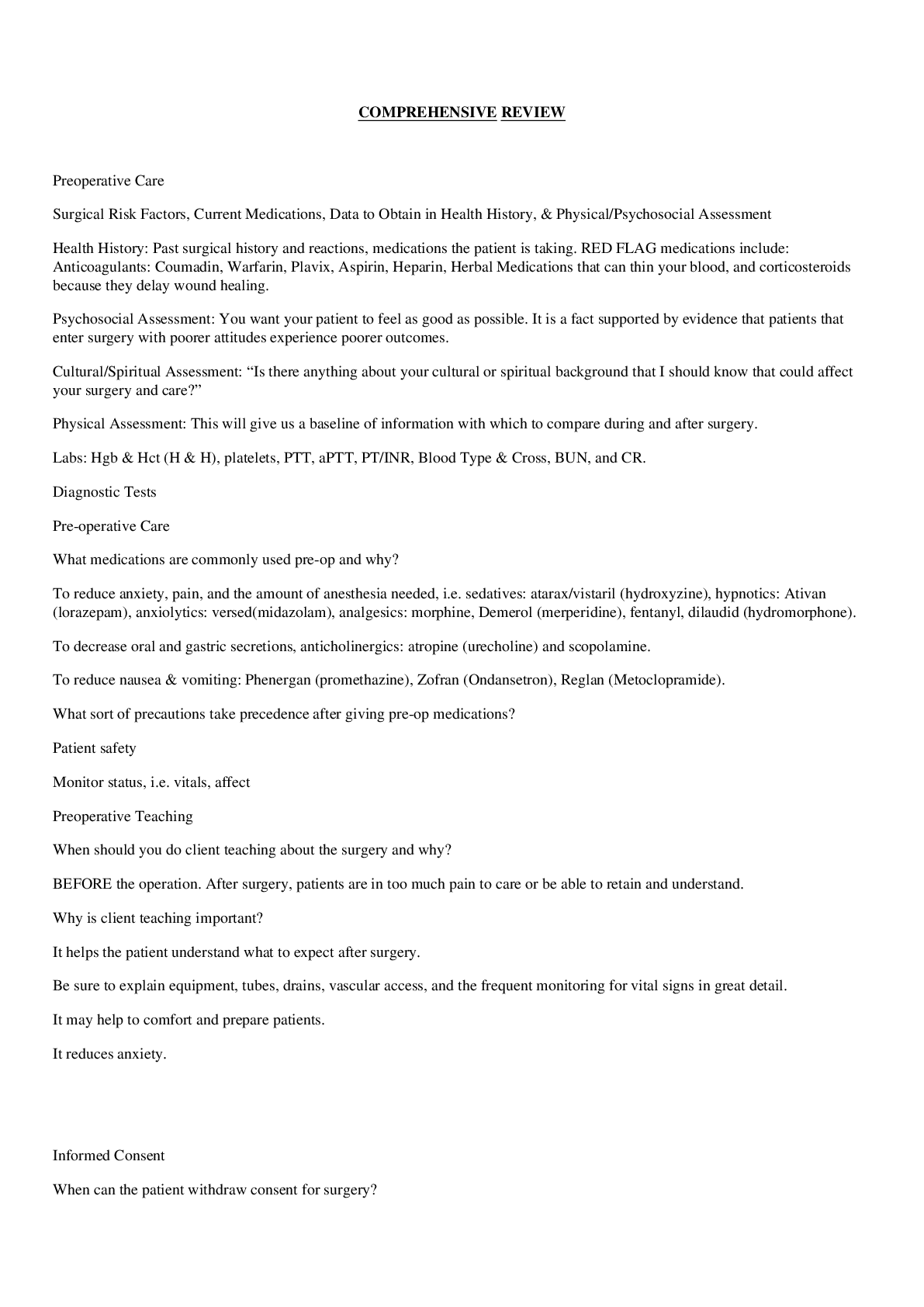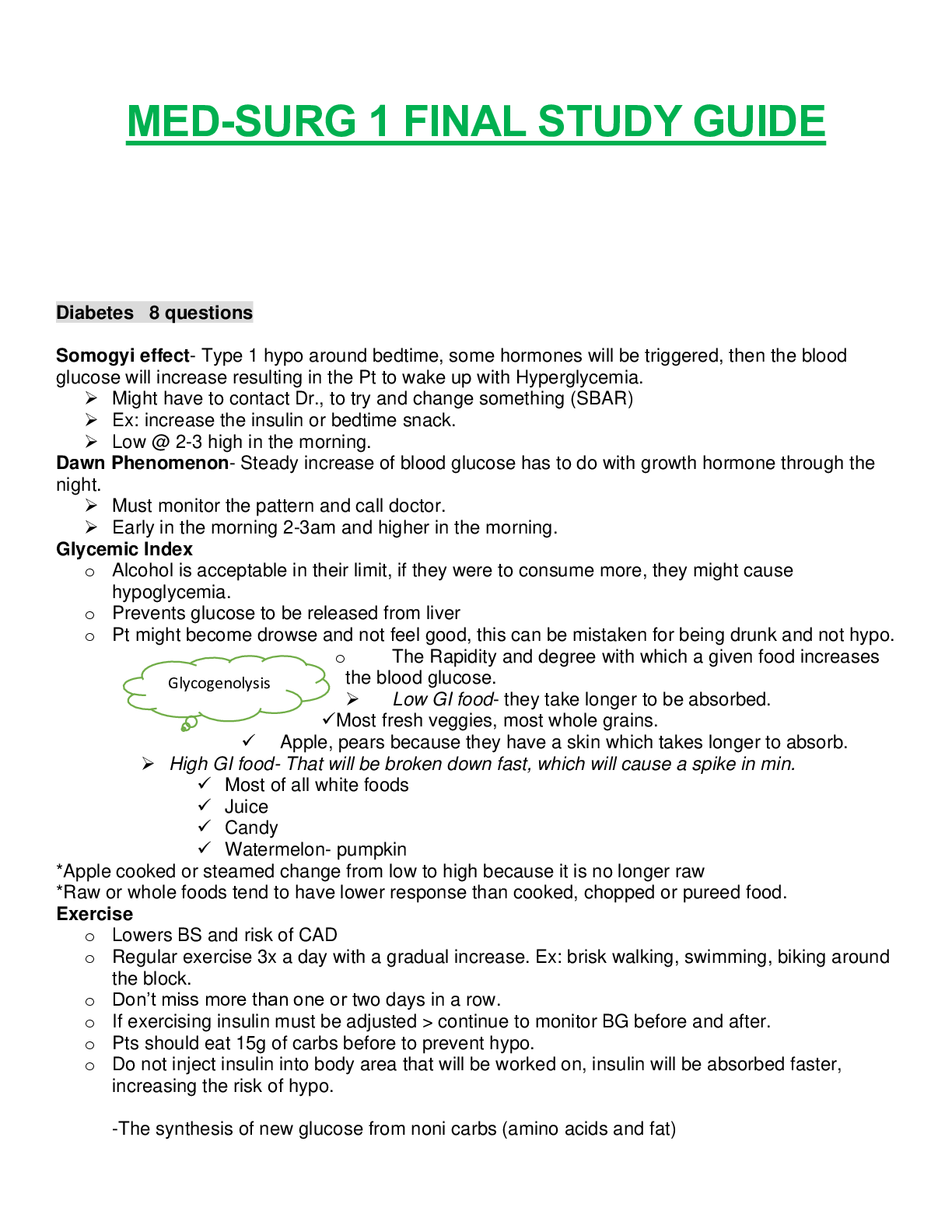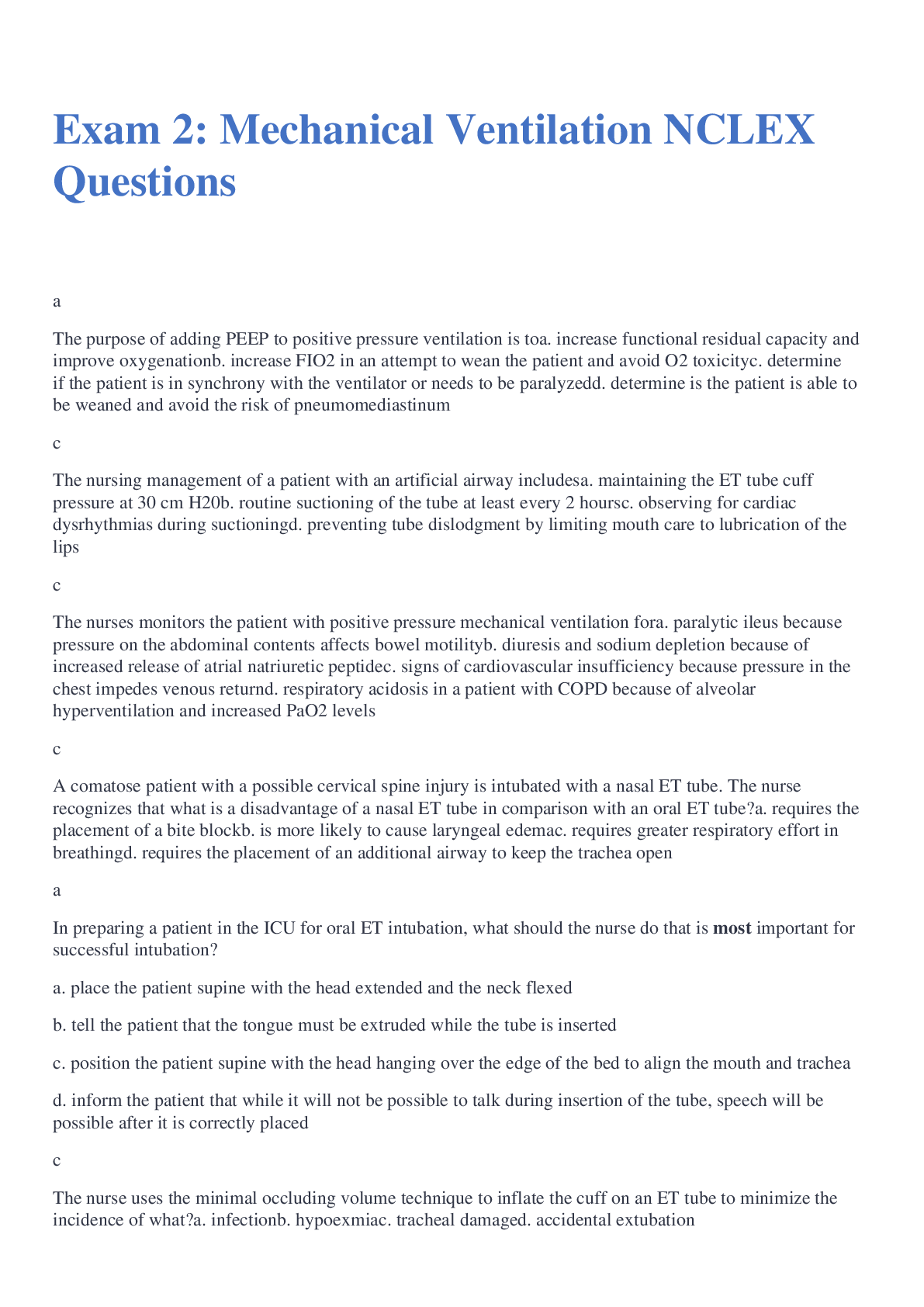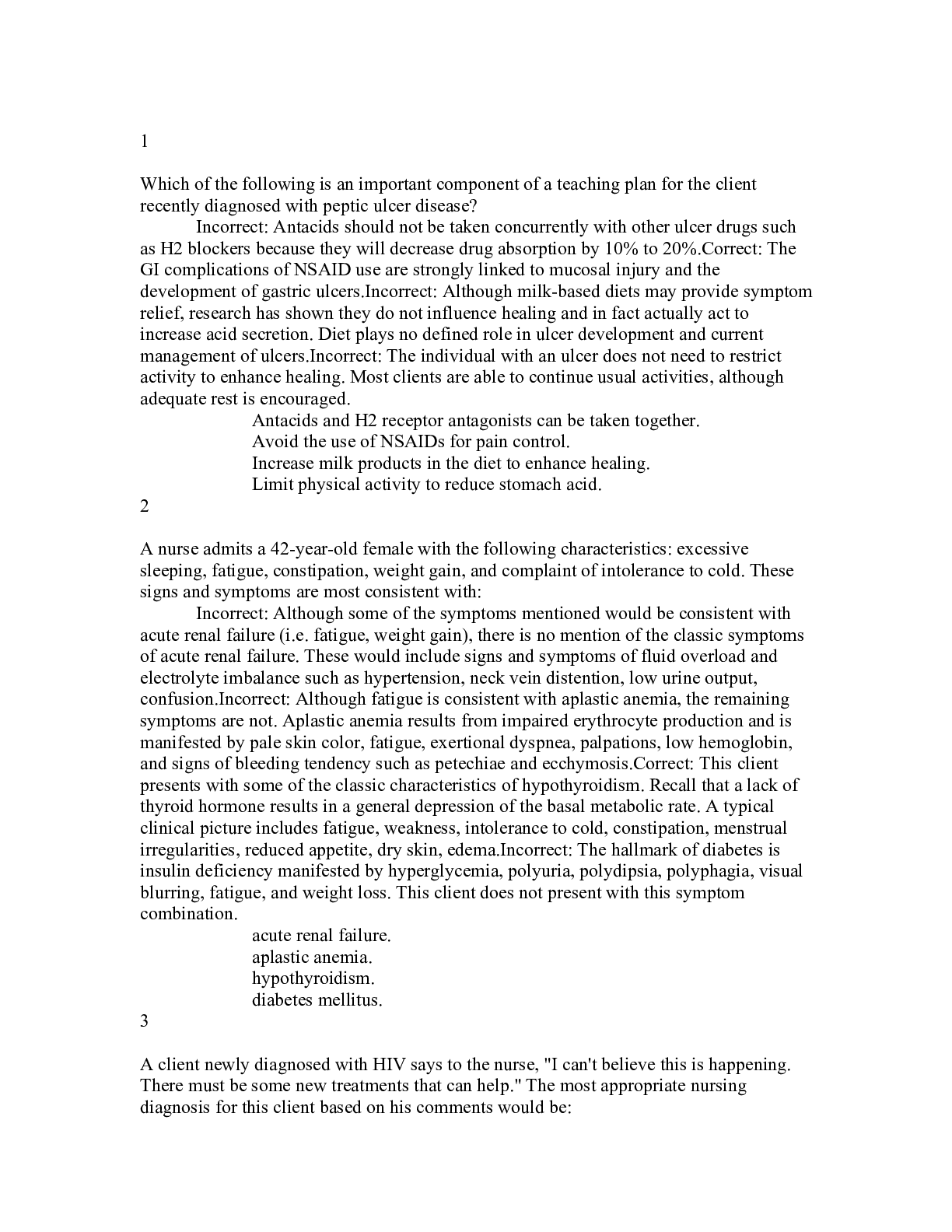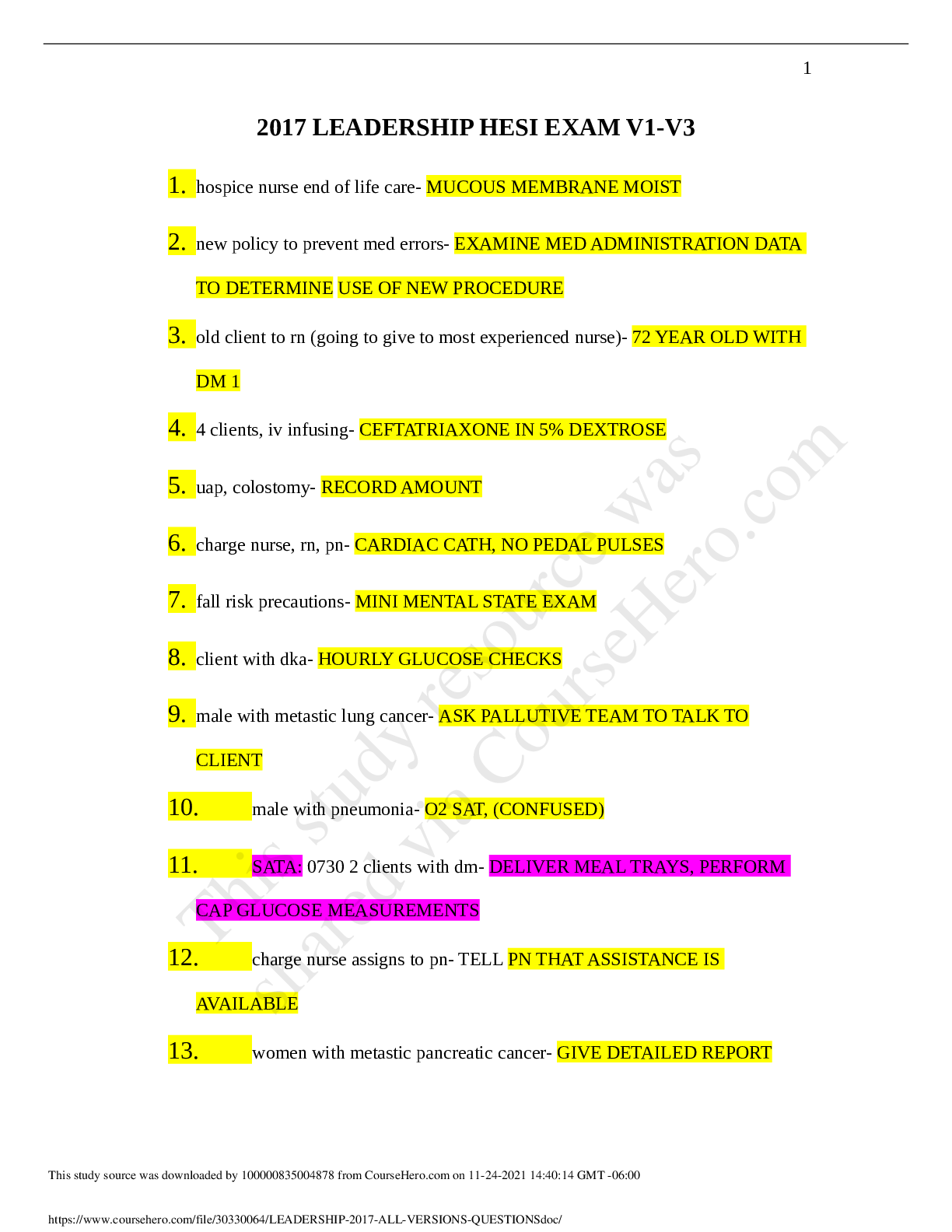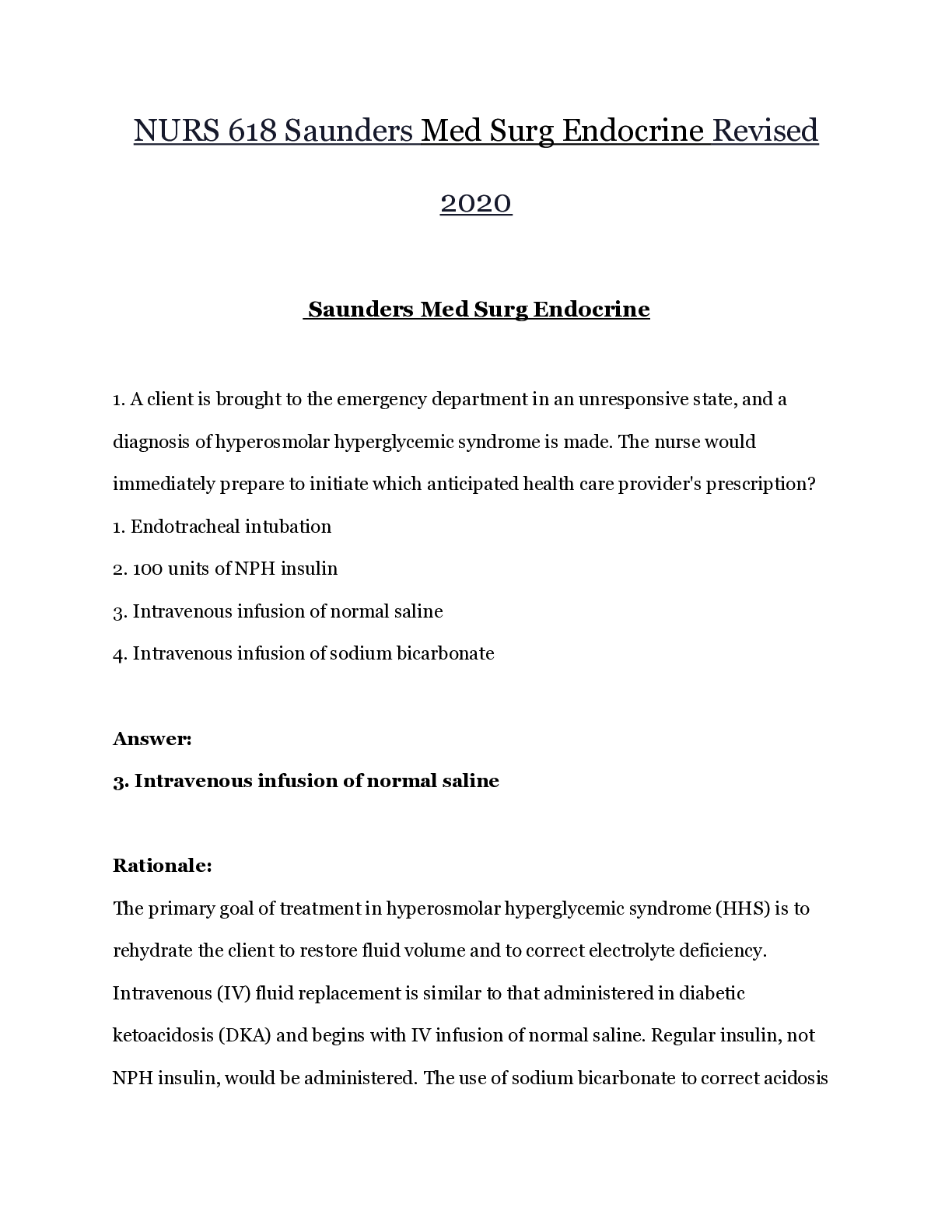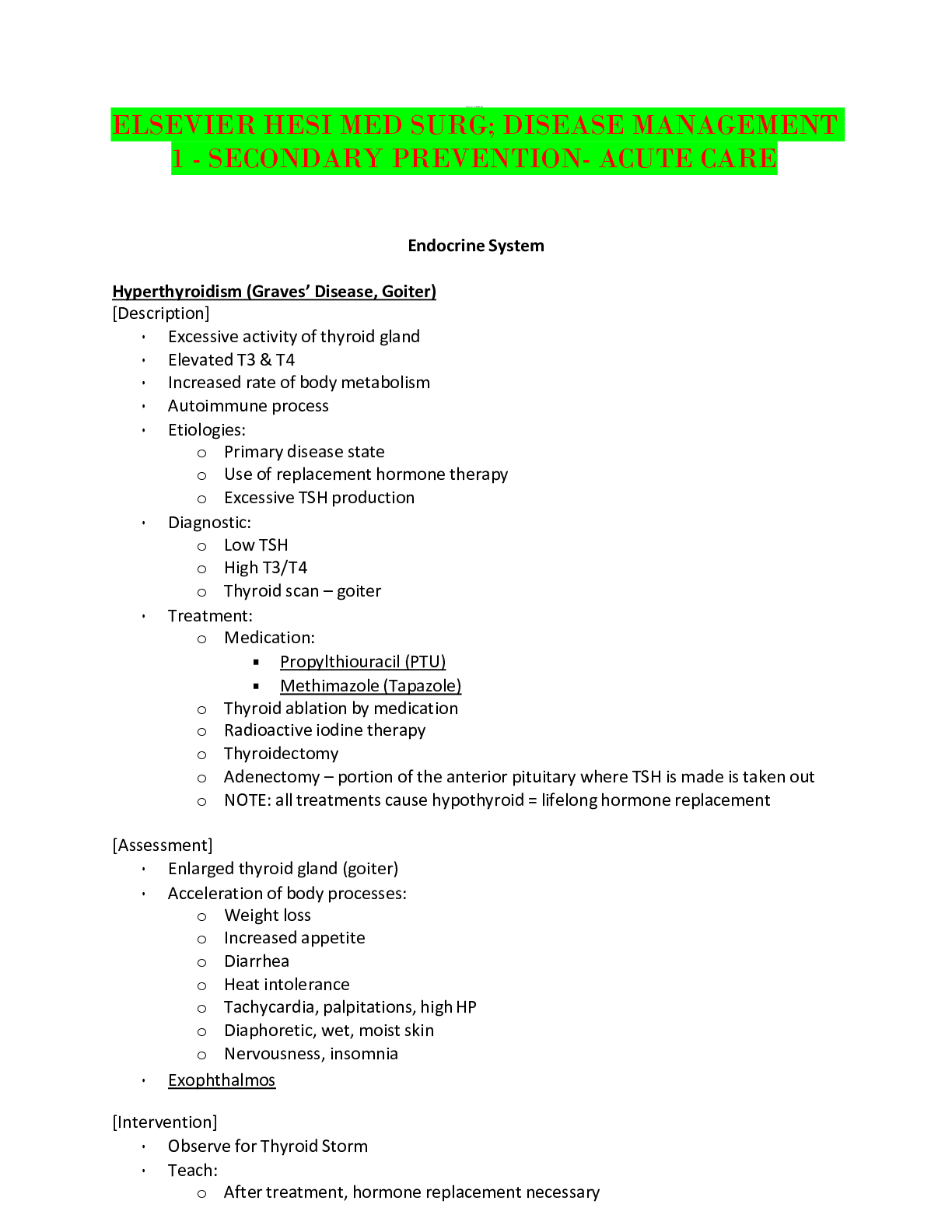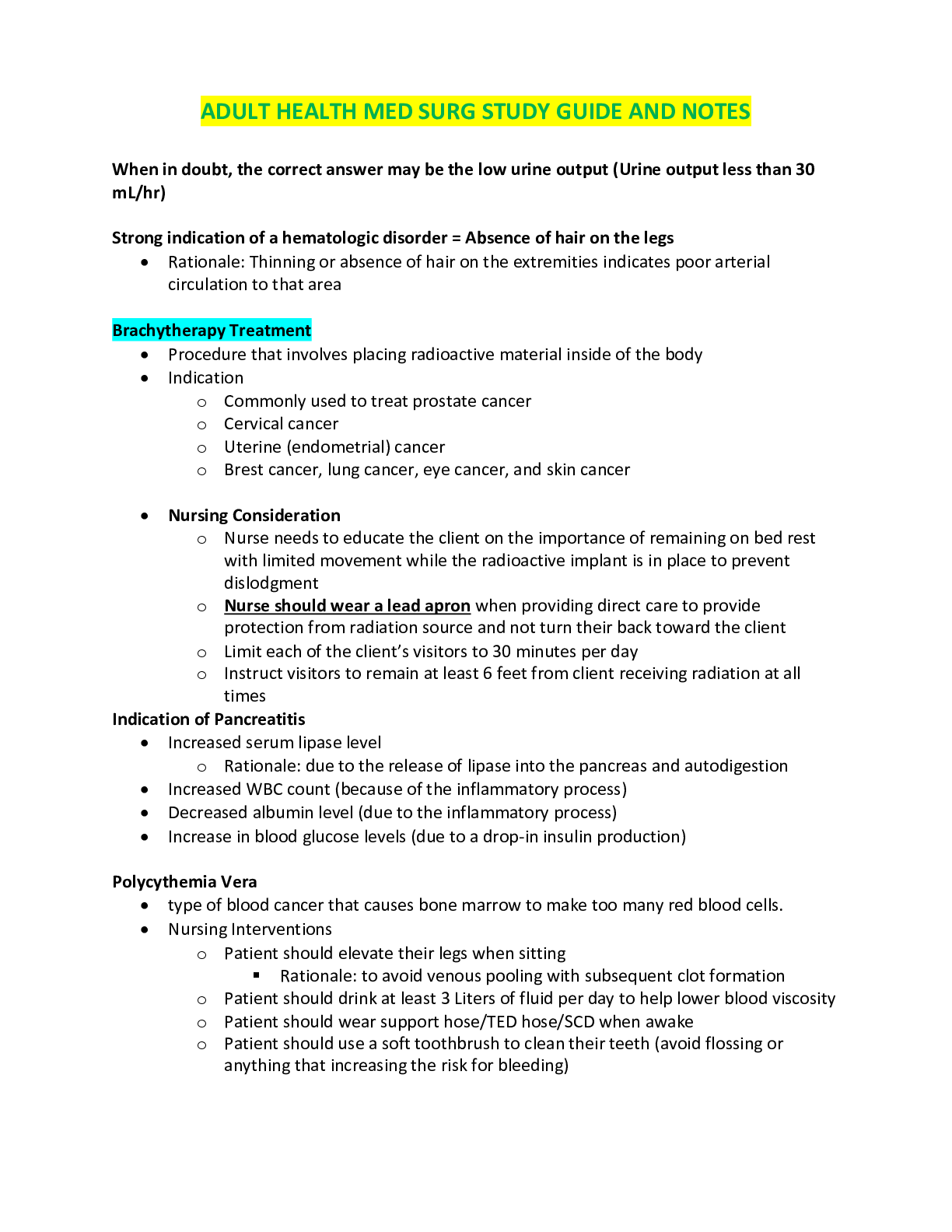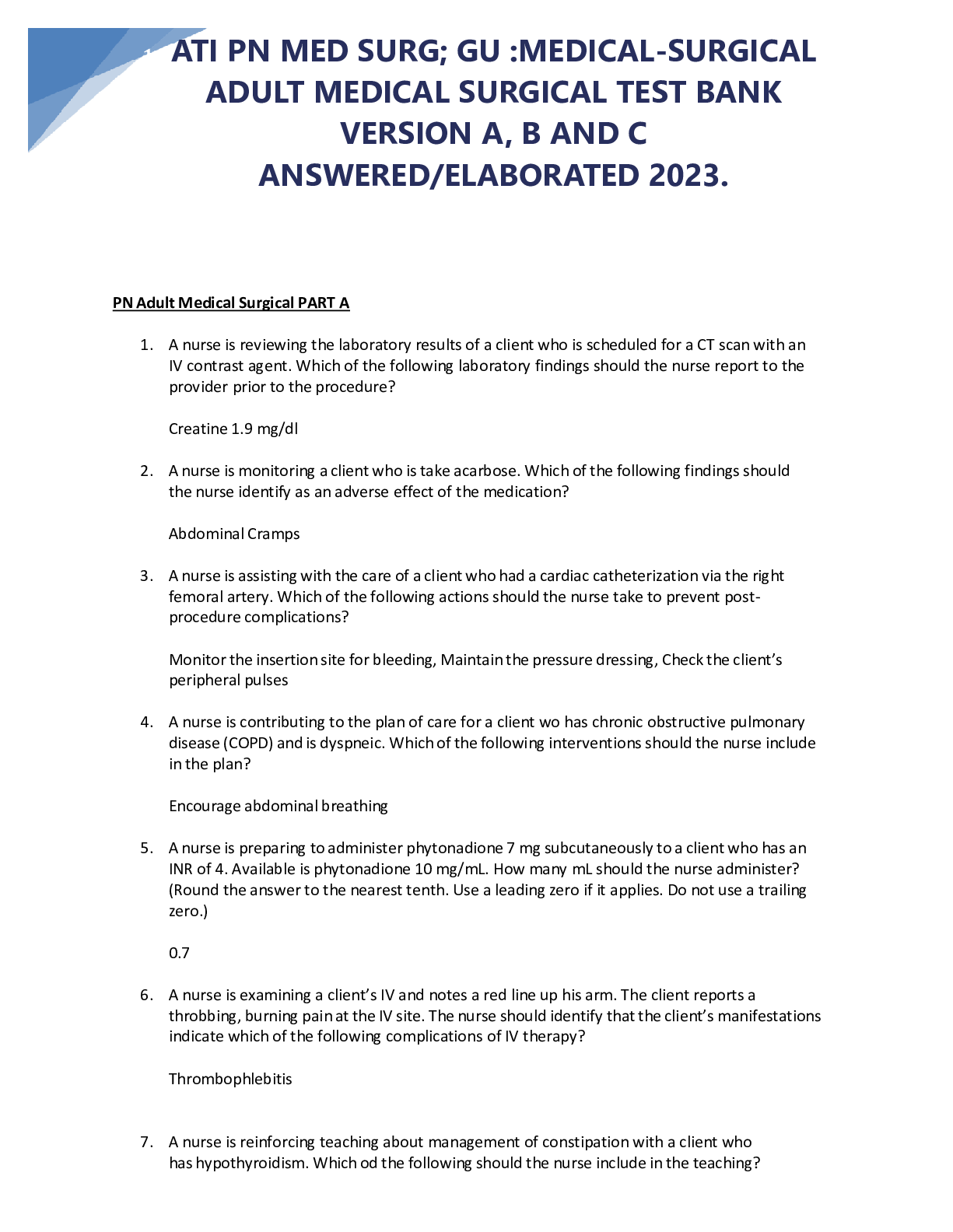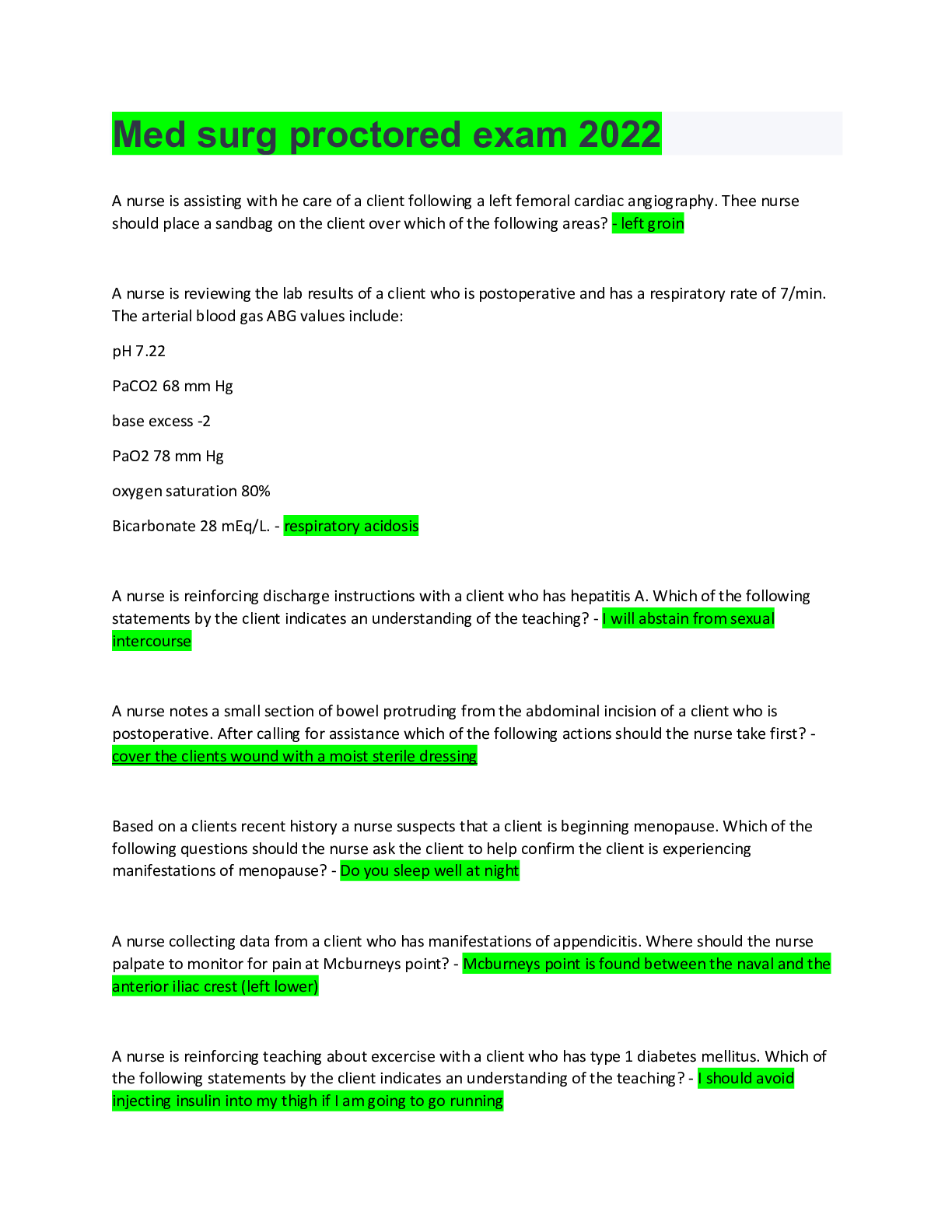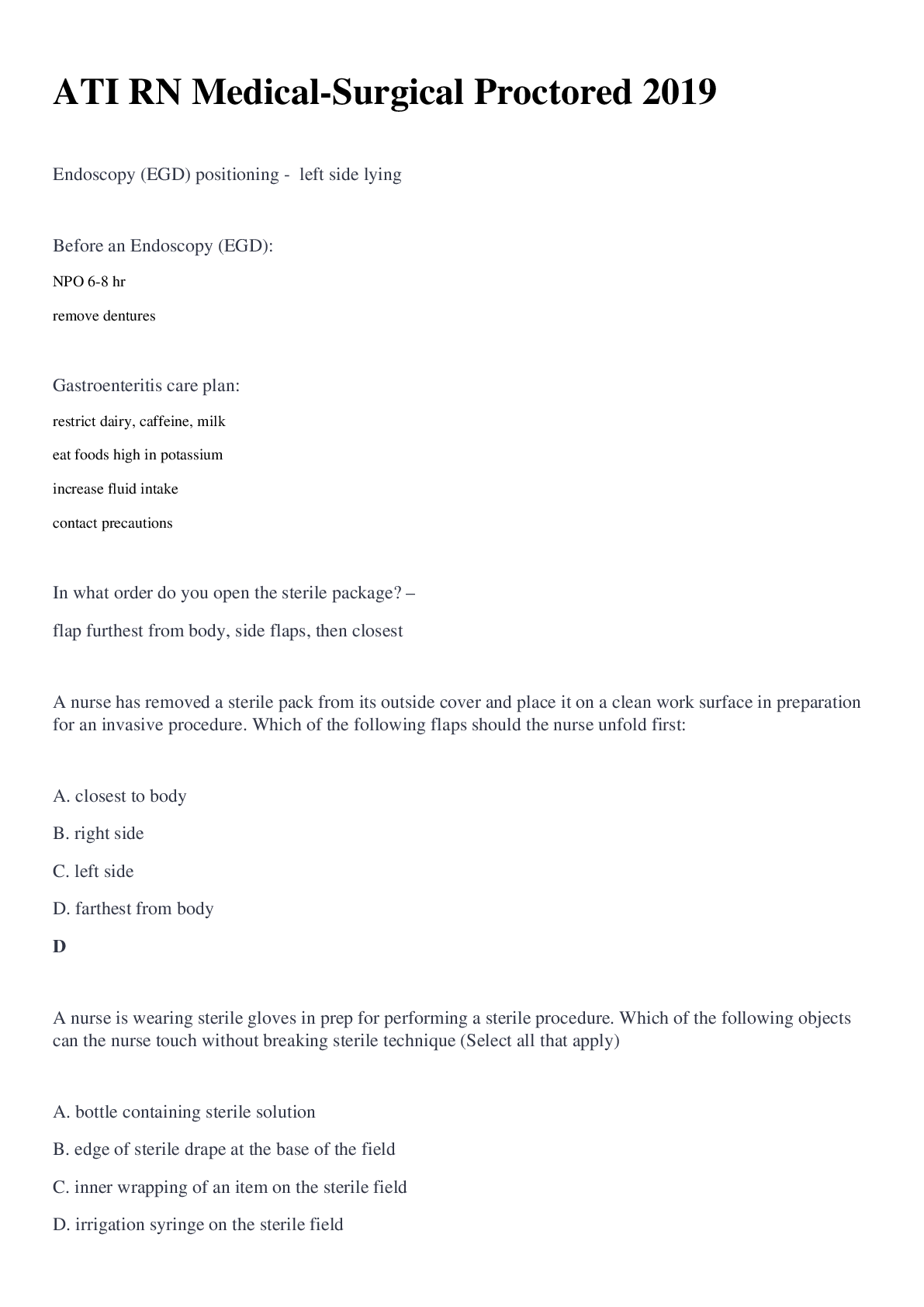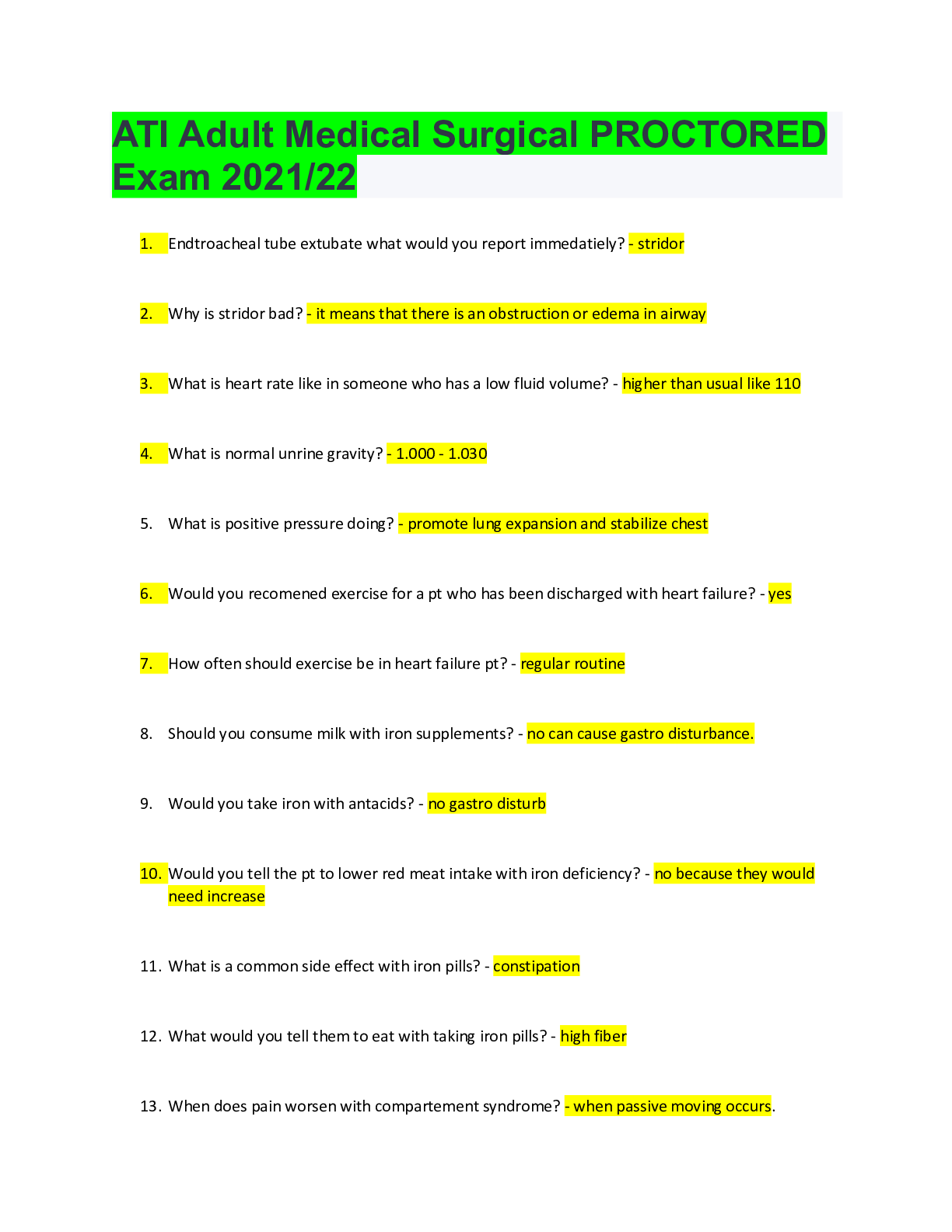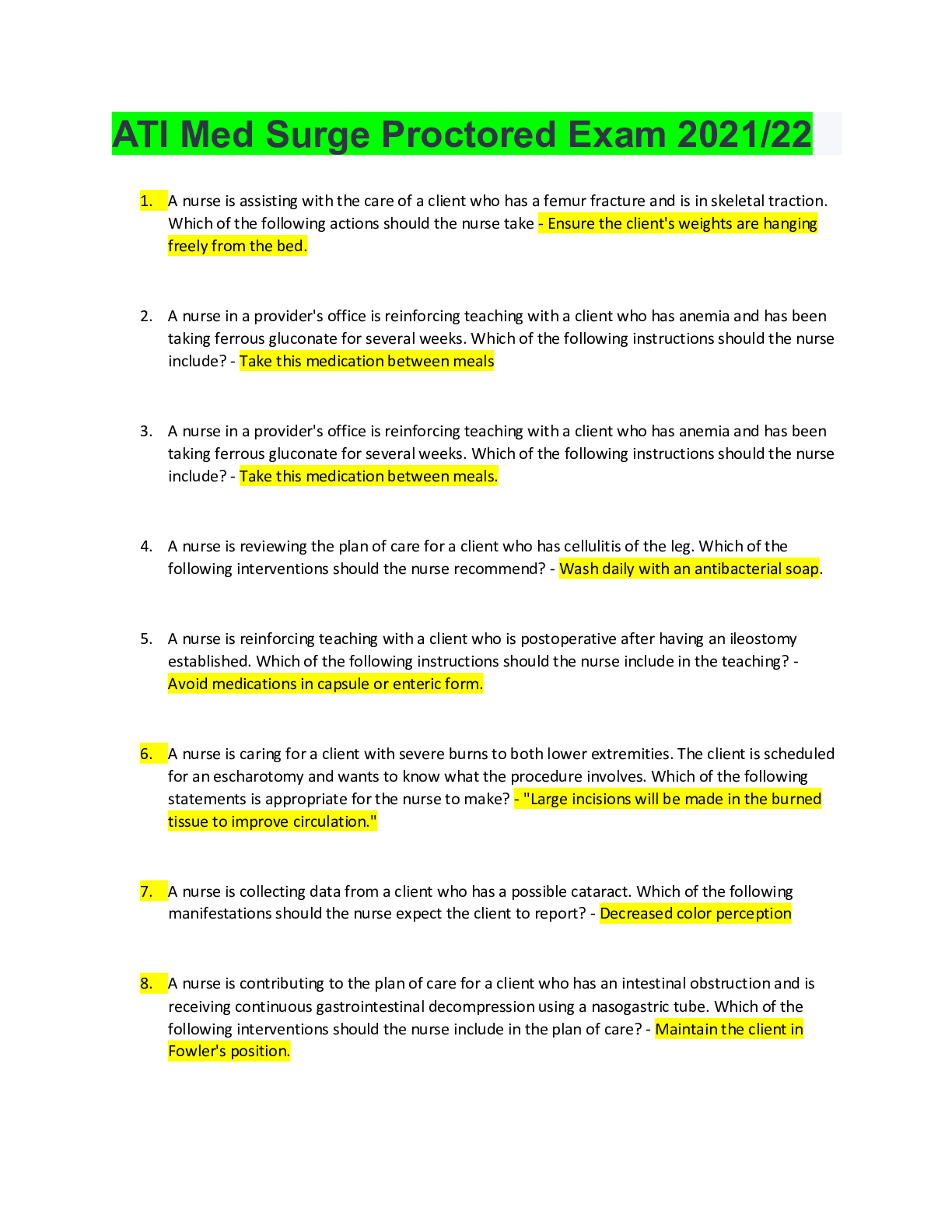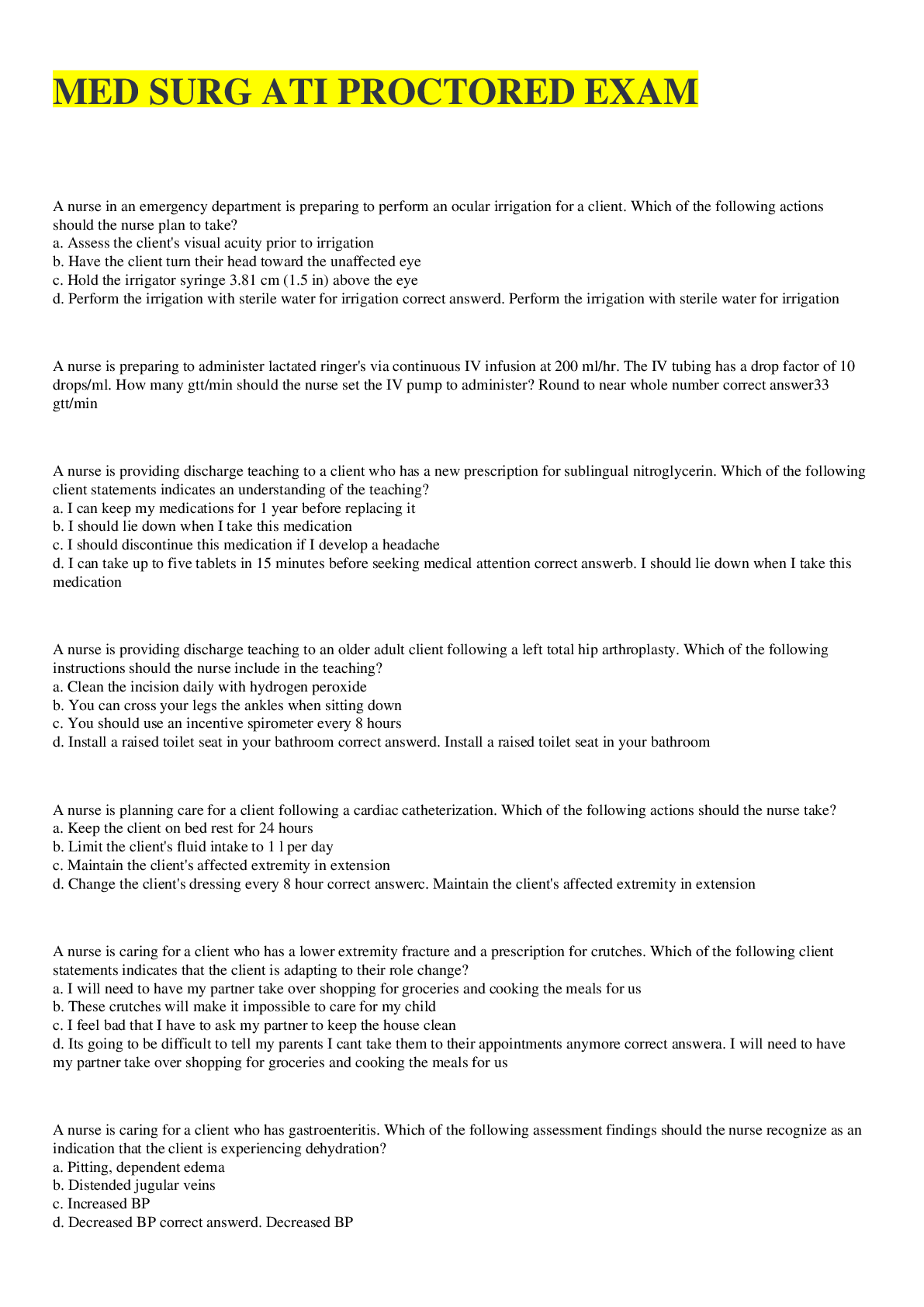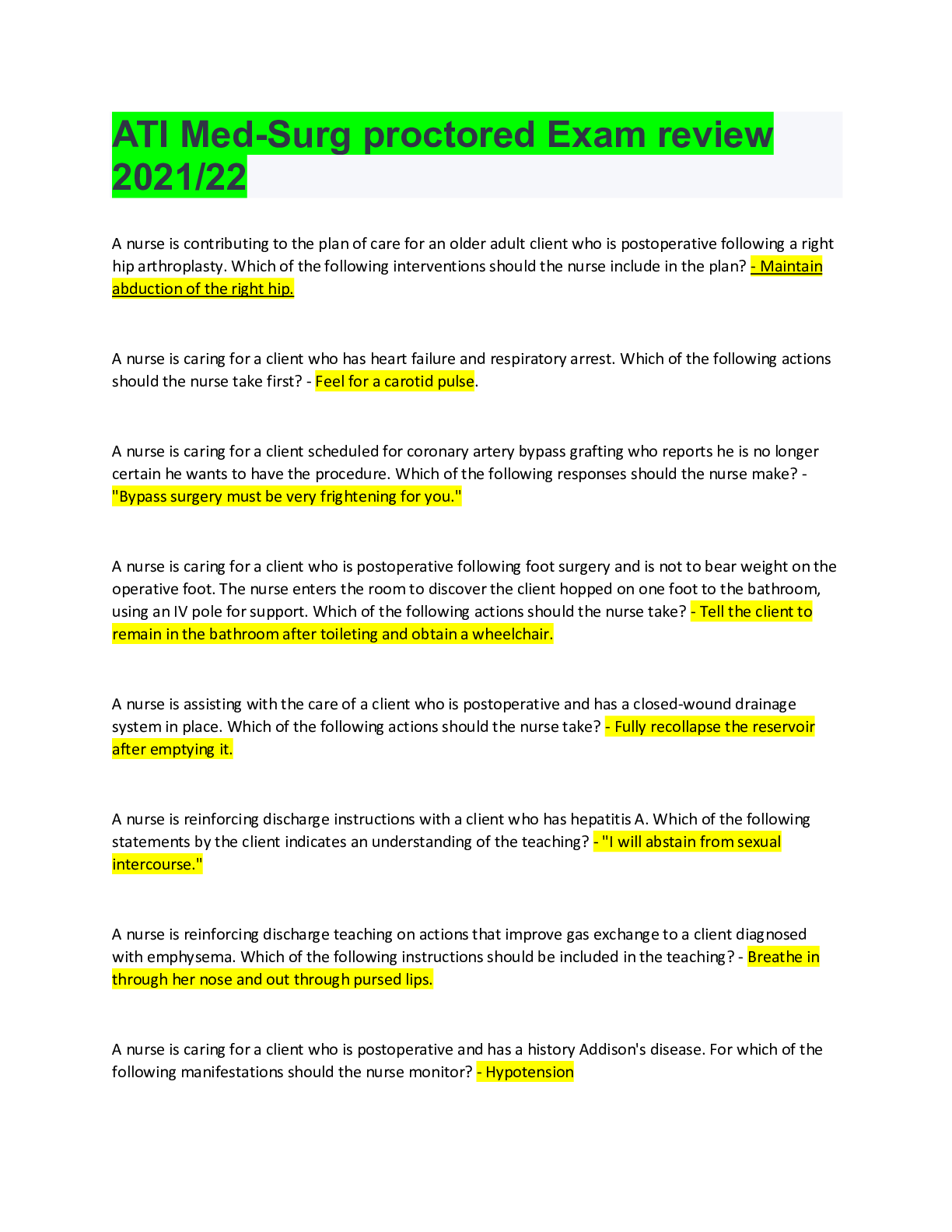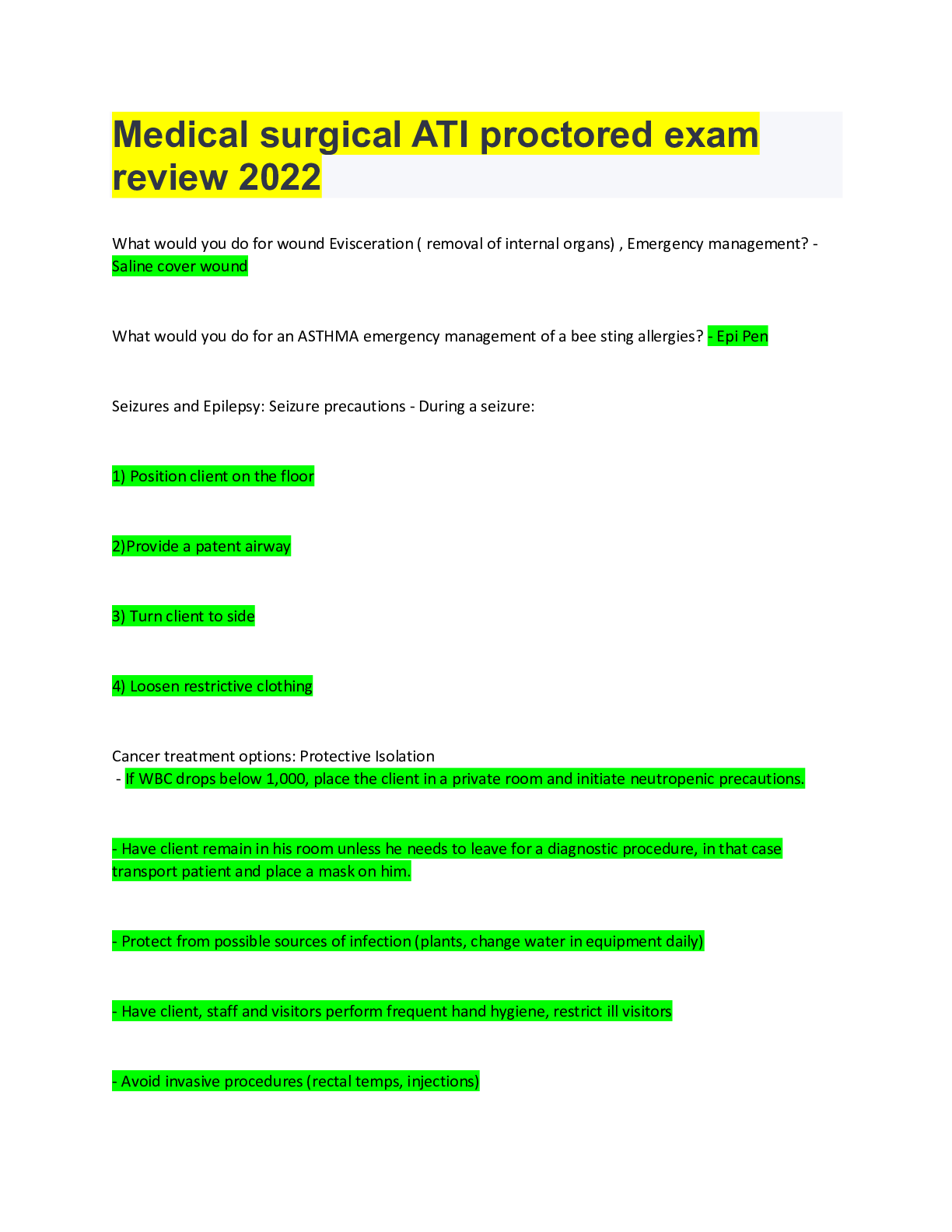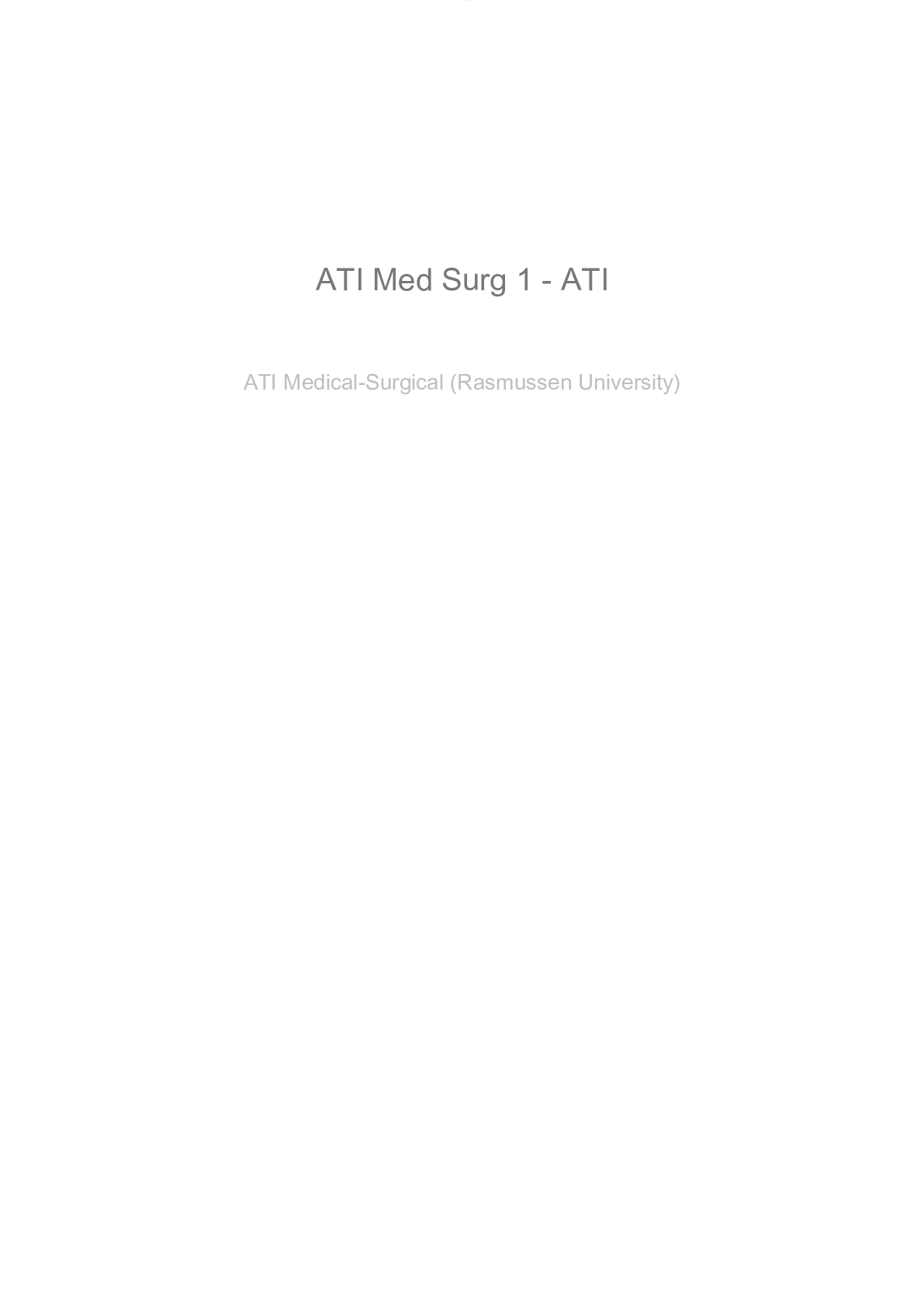Medicine > MED-SURG EXAM > (answered? summer 2022) Perioperative Care NCLEX Questions - MED SURG FINAL (All)
(answered? summer 2022) Perioperative Care NCLEX Questions - MED SURG FINAL
Document Content and Description Below
Perioperative Care NCLEX Questions - MED SURG FINAL A patient is to have a left inguinal hernia repair at the outpatient surgical clinic. Preoperatively, it is most important for the nurse to deter... mine whether the a. patient has had any experience with outpatient surgery in the past. b. patient's medical plan covers outpatient surgery. c. patient plans to stay overnight at the surgical center. d. patient has someone available for transportation and care at home. The nurse is assessing a 36-year-old woman who has been admitted for knee surgery. Which information obtained during the preoperative assessment should be reported to the surgeon before surgery? a. The patient's lack of knowledge about postoperative pain control measures b. The patient's statement that her last menstrual period was 8 weeks previously c. The patient's history of a postoperative infection following a prior cholecystectomy d. The patient's concern that she will be unable to care for her children postoperatively During the preoperative assessment of a patient scheduled for a colon resection, the patient tells the nurse about using St. John's wort to prevent depression. The nurse should alert the staff in the postanesthesia recovery area that the patient may a. have more postoperative bleeding than expected b. take longer to recover from the anesthesia c. have hypertensive episodes d. experience increased pain The nurse asks a hospitalized patient to sign the operative permit as directed in the health care provider's preoperative orders. The patient tells the nurse, "I do not really understand what is involved in the surgery." The nurse should a. postpone the consent form signing and notify the holding room staff that the health care provider needs to discuss the surgery with the patient. b. explain what the planned surgical procedure entails before having the patient sign the consent form. c. have the patient sign the form and ask the health care provider to visit the patient before surgery to further explain the procedure. d. Have the patient sign the from and then Notify the health care provider that the informed consent process is not complete. During the preoperative interview with the nurse, a patient scheduled for an elective hysterectomy to treat benign tumors of the uterus tells the nurse that she just does not know whether she can go through with the surgery because she knows she will die in surgery as her mother did. The most appropriate response by the nurse is A. "Tell me more about what happened to your mother." B. "You will receive medications to reduce your anxiety." C. "Surgical techniques have improved a lot in recent years." D. "Many people have fears and anxieties about surgery." The patient's statement may indicate an unusually high anxiety level or a family history of problems such as malignant hyperthermia, which will require precautions during surgery. The other statements are accurate, but the nurse's initial response should be further assessment. Which information about medication use in a preoperative patient is most important to communicate to the health care provider? A. The patient takes garlic capsules daily but did not take any on the surgical day. B. The patient took a sedative medication the previous night to assist in falling asleep. C. The patient uses acetaminophen (Tylenol) as needed for occasional aches and pains. D. The patient has a history of cocaine use but quit using the drug over 10 years ago. Chronic use of garlic may predispose to intraoperative and postoperative bleeding. The use of a sedative the previous night, occasional acetaminophen use, and a distant history of cocaine use will not impact on the surgical outcome. Ten minutes after receiving the ordered preoperative opioid by intravenous (IV) injection, the patient asks to get up to go to the bathroom to urinate. The most appropriate action by the nurse is to A. offer a urinal or bedpan and position the patient in bed to promote voiding. B. assist the patient to the bathroom and stay with the patient to prevent falls. C. ask the patient to wait because catheterization is performed at the beginning of the surgical procedure. D. allow the patient up to the bathroom because the onset of the medication takes more than 10 minutes. The patient will be at risk for a fall after receiving the opioid, so the best nursing action is to have the patient use a bedpan or urinal. Having the patient get up either with assistance or independently increases the risk for a fall. The patient will be uncomfortable and risk involuntary incontinence if the bladder is full during transport to the operating room. A patient becomes restless and agitated in the in the postanesthesia care unit (PACU) as he begins to regain consciousness. The first action the nurse should take is: A. administer the ordered postoperative pain medication. B. turn the patient to a lateral position. C. check the patient's oxygen saturation with a pulse oximeter. D. orient the patient and tell him that the surgery is over. While in the PACU, the patient's blood pressure drops from an admission pressure of 126/82 to 106/78 with a pulse change of 70 to 94. The nurse administers oxygen and then A. increases the rate of the IV fluids. B. performs neurovascular checks on the lower extremities. C. uses a cardiac monitor to assess the patient's heart rhythm. D. notifies the anesthesia care provider. The nurse is preparing to discharge a patient from the ambulatory surgery center following an inguinal hernia repair. The nurse delays the release of the patient upon discovering that the patient A. had IV morphine 45 minutes ago. B. has an oxygen saturation of 92%. C. has not voided since before surgery. D. had one episode of vomiting 30 minutes ago. An overweight patient (BMI 28.1 kg/m2) is scheduled for a laparoscopic cholecystectomy at an outpatient surgery setting. The nurse knows that a. surgery will involve multiple small incisions. b. this setting is not appropriate for this procedure. c. surgery will involve removing a portion of the liver. d. the patient will need special preparation because of obesity The patient tells the nurse in the preoperative setting that she has noticed she has a reaction when wearing rubber gloves. What is the most appropriate intervention? a. Notify the surgeon so that the case can be cancelled. b. Ask additional questions to assess for a possible latex allergy. c. Notify the OR staff immediately so that latex-free supplies can be used. d. No intervention is needed because the patient's rubber sensitivity has no bearing on surgery. A 59-year-old man scheduled for a herniorrhaphy in 2 days reports that he takes ginkgo daily. What is the priority intervention? a. Inform the surgeon, since the procedure may have to be rescheduled. b. Notify the anesthesia care provider, since this herb interferes with anesthetics. c. Ask the patient if he has noticed any side effects from taking this herbal supplement. d. Tell the patient to continue to take the herbal supplement up to the day before surgery. A 17-year-old patient with a leg fracture who is scheduled for surgery is an emancipated minor. She has a statement from the court for verification. Which intervention is most appropriate? a. Witness the permit after consent is obtained by the surgeon. b. Call a parent or legal guardian to sign the permit, since the patient is under 18. c. Obtain verbal consent, since written consent is not necessary for emancipated minors. d. Investigate your state's nurse practice act related to emancipated minors and informed consent. A priority nursing intervention to assist a preoperative patient in coping with fear of postoperative pain would be to a. inform the patient that pain medication will be available. b. teach the patient to use guided imagery to help manage pain. c. describe the type of pain expected with the patient's particular surgery. d. explain the pain management plan, including the use of a pain rating scale. A patient is scheduled for surgery requiring general anesthesia at an ambulatory surgical center. The nurse asks him when he ate last. He replies that he had a light breakfast a couple of hours before coming to the surgery center. What should the nurse do first? a. Tell the patient to come back tomorrow, since he ate a meal. b. Proceed with the preoperative checklist, including site identification. c. Notify the anesthesia care provider of when and what the patient last ate. d. Have the patient void before administering any preoperative medications. A patient who normally takes 40 units of glargine insulin (long acting) at bedtime asks the nurse what to do about her dose the night before surgery. The best response would be to have her a. skip her insulin altogether the night before surgery. b. get instructions from her surgeon or HCP on any insulin adjustments. c. take her usual dose at bedtime and eat a light breakfast in the morning. d. eat a moderate meal before bedtime and then take half her usual insulin dose. Preoperative considerations for older adults include (select all that apply) a. using only large-print educational materials. b. speaking louder for patients with hearing aids. c. recognizing that sensory deficits may be present. d. providing warm blankets to prevent hypothermia. e. teaching important information early in the morning. , Proper attire for the semirestricted area of the surgery department is a. street clothing. b. surgical attire and head cover. c. surgical attire, head cover, and mask. d. street clothing with the addition of shoe covers. Activities that the nurse might perform in the role of a scrub nurse during surgery include (select all that apply) a. checking electrical equipment. b. preparing the instrument table. c. passing instruments to the surgeon and assistants. d. coordinating activities occurring in the operating room. e. maintaining accurate counts of sponges, needles, and instruments. , The nurse is caring for a patient undergoing surgery for a knee replacement. What is critical to the patient's safety during the procedure (select all that apply)? a. Universal protocol is followed. b. The ACP is an anesthesiologist. c. The patient has adequate health insurance. d. The patient's family is in the surgery waiting area. e. The patient's allergies are conveyed to the surgical team. , The nurse's primary responsibility for the care of the patient undergoing surgery is a. developing an individualized plan of nursing care for the patient. b. carrying out specific tasks related to surgical policies and procedures. c. ensuring that the patient has been assessed for safe administration of anesthesia. d. performing a preoperative history and physical assessment to identify patient needs. When scrubbing at the scrub sink, the nurse should a. scrub from elbows to hands. b. scrub without mechanical friction. c. scrub for a minimum of 10 minutes. d. hold the hands higher than the elbows. When positioning a patient in preparation for surgery, the nurse understands that injury to the patient is most likely to occur as a result of a. incorrect musculoskeletal alignment. b. loss of perception of pain or pressure. c. pooling of blood in peripheral vessels. d. disregarding the patient's need for modesty IV induction for general anesthesia is the method of choice for most patients because a. the patient is not intubated. b. the agents are nonexplosive. c. induction is rapid and pleasant. d. emergence is longer but with fewer complications. When a patient is admitted to the PACU, what are the priority interventions the nurse performs? a. Assess the surgical site, noting presence and character of drainage. b. Assess the amount of urine output and the presence of bladder distention. c. Assess for airway patency and quality of respirations and obtain vital signs. d. Review results of intraoperative laboratory values and medications received. A patient is admitted to the PACU after major abdominal surgery. During the initial assessment the patient tells the nurse he thinks he is going to "throw up." A priority nursing intervention is to a. increase the rate of the IV fluids. b. obtain vital signs, including O2 saturation. c. position patient in lateral recovery position. d. administer antiemetic medication as ordered. After admission of the postoperative patient to the clinical unit, which assessment data require the most immediate attention? a. O2 saturation of 85% b. Respiratory rate of 13/min c. Temperature of 100.4° F (38° C) d. Blood pressure of 90/60 mm Hg A 70-kg postoperative patient has an average urine output of 25 mL/hr during the first 8 hours. The priority nursing intervention(s) given this assessment would be to a. perform a straight catheterization to measure the amount of urine in the bladder. b. notify the physician and anticipate obtaining blood work to evaluate renal function. c. continue to monitor the patient because this is a normal finding during this time period. d. evaluate the patient's fluid volume status since surgery and obtain a bladder ultrasound. Discharge criteria for the Phase II patient include (select all that apply) a. no nausea or vomiting. b. ability to drive self home. c. no respiratory depression. d. written discharge instructions understood. e. opioid pain medication given 45 minutes ago. , [Show More]
Last updated: 1 year ago
Preview 1 out of 10 pages
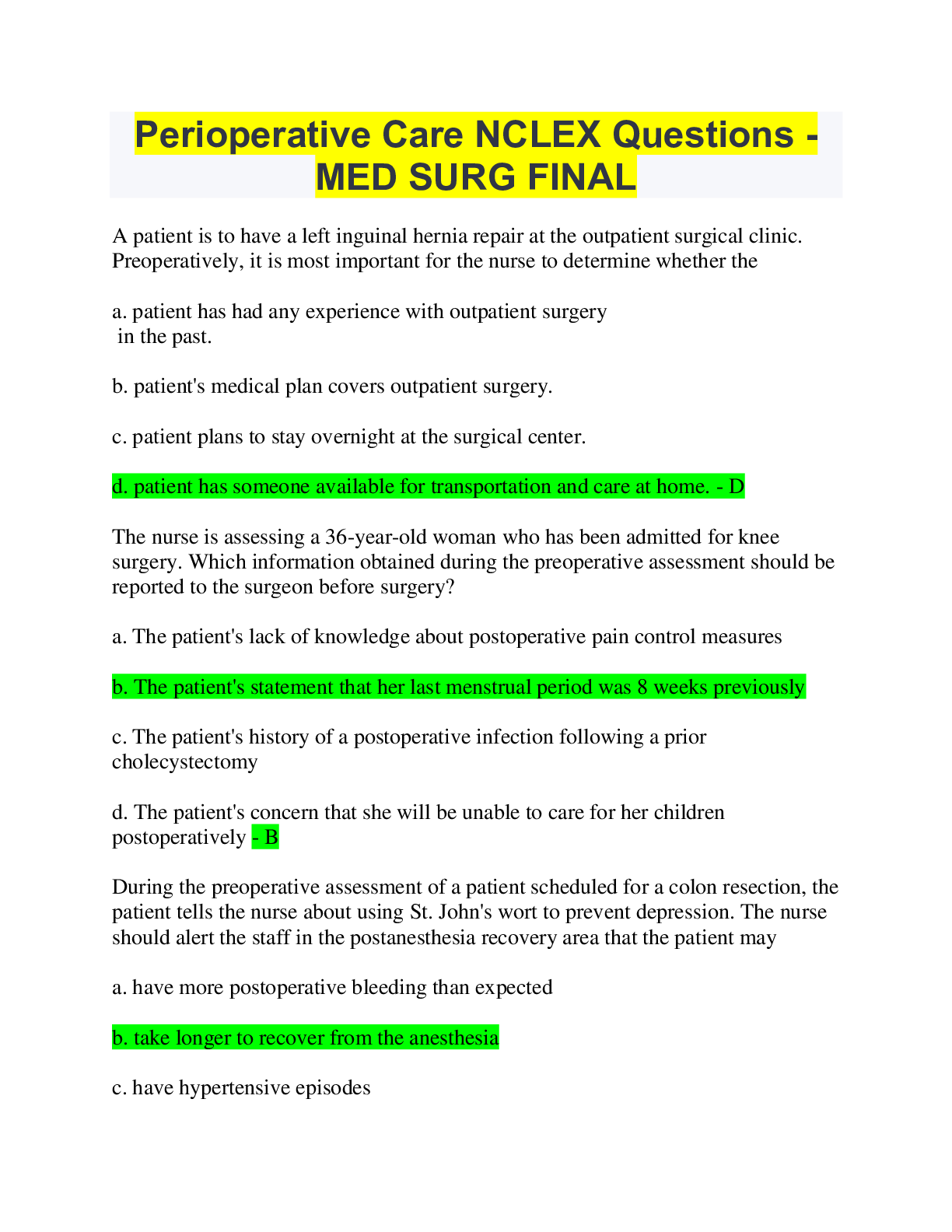
Reviews( 0 )
Document information
Connected school, study & course
About the document
Uploaded On
Jun 27, 2022
Number of pages
10
Written in
Additional information
This document has been written for:
Uploaded
Jun 27, 2022
Downloads
0
Views
109



